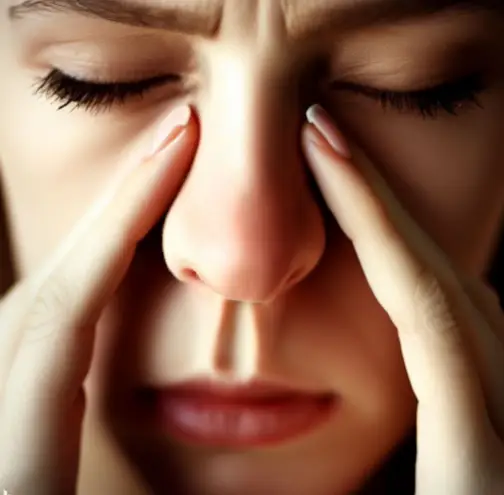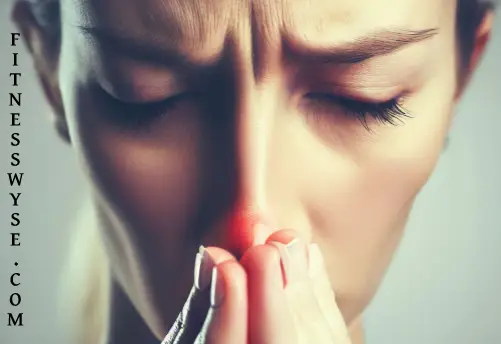should you workout with a sinus infection

Table of Contents
1. The Sinus Infection Conundrum: To Work Out or Not?
Sinus infections, medically known as sinusitis, are a common ailment that can leave you feeling under the weather. When you’re dedicated to your fitness routine, it’s natural to wonder if you should continue working out or hit the pause button when sinusitis strikes. This blog post aims to provide clarity on this topic, helping you make informed decisions about exercising while dealing with a sinus infection.
1.1. The Importance of Balancing Health and Fitness
Maintaining an active lifestyle is crucial for overall health and well-being. Exercise offers numerous benefits, from strengthening your immune system to enhancing mood and energy levels. However, it’s equally important to prioritize your health when you’re unwell. Sinus infections can vary in severity, and understanding how they impact your body is key to striking the right balance between fitness and recovery.
In the sections that follow, we’ll delve into the intricacies of sinus infections, their symptoms, and how exercise can influence your immune response. We’ll also provide guidance on when it’s safe to work out with a mild sinus infection and when it’s best to rest. Let’s explore the world of sinus infections and fitness together.
2. Understanding Sinus Infections

2.1. Demystifying Sinusitis: What Is It?
Before we dive into the fitness aspect, let’s gain a clear understanding of what sinusitis, or a sinus infection, entails. Sinusitis is the inflammation of the sinuses, which are air-filled cavities in the skull. It’s often caused by viral or bacterial infections, allergies, or other factors.
2.2. Common Symptoms of Sinus Infections
Recognizing the symptoms of a sinus infection is crucial for determining how it might affect your exercise routine. Symptoms often include:
- Nasal congestion: Difficulty breathing through your nose.
- Facial pain: Pressure and discomfort around the eyes, nose, and cheeks.
- Headache: Often concentrated in the forehead region.
- Runny or stuffy nose: Excessive mucus production or blockage.
- Fatigue: Feeling tired and drained due to the infection.
2.3. Causes of Sinus Infections
Understanding the causes can help you pinpoint potential triggers. Common causes include:
- Viral Infections: Such as the common cold or influenza.
- Bacterial Infections: Less common but can be more severe.
- Allergies: Environmental factors like pollen or dust.
- Nasal Polyps: Noncancerous growths in the nasal passages.
By comprehending the nature and symptoms of sinus infections, you’ll be better equipped to assess whether it’s advisable to engage in physical activity during this time. In the next sections, we’ll explore the relationship between exercise and your immune system, shedding light on how working out can impact your sinus infection.
3. Exercise and Immune System
3.1. How Exercise Affects the Immune System
Before we discuss working out with a sinus infection, let’s explore the fascinating relationship between exercise and the immune system.
3.1.1. Positive Effects
- Exercise can boost the immune system by promoting the circulation of immune cells and enhancing their ability to combat pathogens.
- Regular physical activity is associated with reduced inflammation and a lower risk of chronic diseases, indirectly supporting immune function.
3.1.2. Negative Effects
- Excessive or intense exercise, such as overtraining, can temporarily suppress the immune system, making you more susceptible to infections.
- Timing matters: intense workouts when you’re already unwell can sometimes worsen the illness.
3.2. Table: Exercise and the Immune System
Let’s summarize the effects of exercise on the immune system in a table:
| Exercise Effects on the Immune System | Impact |
| Positive | – Enhanced immune cell activity |
| – Reduced inflammation | |
| – Lower risk of chronic diseases | |
| Negative | – Temporary immune suppression (with overtraining) |
| – Potential exacerbation of illness (if working out while unwell) |
Understanding these effects is vital for determining whether it’s advisable to engage in physical activity during a sinus infection. In the next sections, we’ll delve into specific scenarios, such as mild sinus infections and severe cases, to provide guidance on your workout decisions.
4. Exercising with Mild Sinus Infections
4.1. Guidelines for Working Out with a Mild Sinus Infection
When dealing with a mild sinus infection, you may wonder if it’s safe to continue exercising. Here are some guidelines to consider:
4.1.1. Listen to Your Body
- Pay close attention to how you feel. If you have mild symptoms like nasal congestion or a runny nose but otherwise feel okay, gentle exercise may be manageable.
4.1.2. Lower Intensity Workouts
- Opt for lower-intensity workouts, such as walking, yoga, or light stretching, instead of high-intensity training or heavy lifting.
4.1.3. Stay Hydrated
- Drink plenty of water to stay hydrated, as this can help alleviate symptoms like a sore throat.
4.1.4. Avoid Overexertion
- Steer clear of pushing yourself too hard. Overexertion can lead to increased fatigue and potentially worsen your sinus infection.
In the next section, we’ll explore scenarios where it’s advisable to skip workouts and prioritize rest, especially in cases of severe sinus infections.
read more : SHOULD YOU DRINK LIQUID I.V. BEFORE OR AFTER A WORKOUT?
5. Exercising with Severe Sinus Infections
5.1. When to Avoid Exercise Due to a Severe Sinus Infection
Severe sinus infections can be more debilitating, and working out during this time may not be advisable. Here are important considerations:
5.1.1. High Fever and Fatigue
- If you have a high fever, extreme fatigue, or severe body aches, it’s crucial to prioritize rest. Exercise can exacerbate these symptoms.
5.1.2. Breathing Difficulties
- If your sinus infection is causing significant breathing difficulties, exercise can strain your respiratory system further.
5.1.3. Risk of Spreading Infection
- Exercising in public spaces, such as gyms, can risk spreading the infection to others. Consider the well-being of those around you.
5.1.4. Focus on Recovery
- Severe infections require your body’s full attention to recover. Rest, proper nutrition, and hydration should take precedence over exercise.
In the next sections, we’ll discuss how exercise can impact your recovery process and explore strategies for a smoother recuperation.
6. Impact on Recovery
6.1. How Exercise Can Influence Recovery from a Sinus Infection
Exercise can have both positive and negative effects on your recovery process when dealing with a sinus infection. Understanding these impacts is essential:
6.1.1. Potential Benefits
- Gentle exercise, like light walking or stretching, can improve blood circulation and alleviate mild symptoms like congestion or fatigue.
- Staying active to a reasonable extent can help maintain a positive mood and reduce stress, which can be beneficial for recovery.
6.1.2. Risks of Overexertion
- Overdoing it with intense workouts can strain your body, weaken your immune system, and prolong your recovery time.
- Exercising while experiencing severe symptoms can lead to worsened fatigue and discomfort.
6.2. Balancing Rest and Activity
A balanced approach is key to managing exercise during a sinus infection:
6.2.1. Rest as a Priority
- In severe cases or when symptoms are debilitating, prioritize rest. Allow your body to focus on healing.
- Listen to your body’s signals. If exercise makes you feel worse, it’s best to rest.
6.2.2. Gentle Movement
- If you choose to exercise, opt for gentle activities that don’t strain your body. Keep the intensity low.
By finding the right balance between rest and activity, you can support your recovery process effectively. In the following sections, we’ll explore ways to prevent sinus infections and provide guidance on consulting healthcare professionals when needed.
7. Preventing Sinus Infections

7.1. Tips for Reducing the Risk of Sinus Infections
Prevention is often the best strategy when it comes to sinus infections. Here are some tips to reduce your risk:
7.1.1. Practice Good Hand Hygiene
- Regularly wash your hands with soap and water to prevent the spread of viruses and bacteria.
7.1.2. Maintain a Healthy Lifestyle
- A well-balanced diet, regular exercise, and adequate sleep can help bolster your immune system.
7.1.3. Manage Allergies
- If you have allergies, managing them effectively can reduce your susceptibility to sinusitis.
7.1.4. Stay Hydrated
- Drinking enough water can keep your nasal passages moist and less prone to infections.
7.1.5. Avoid Smoking and Secondhand Smoke
- Smoking can irritate your nasal passages and make you more susceptible to infections. Avoiding smoke exposure is crucial.
In the next section, we’ll emphasize the importance of consulting healthcare professionals when dealing with sinus infections, especially if exercise is a part of your routine.
8. Consulting a Healthcare Professional
8.1. When to Seek Medical Advice Before Exercising
Before making any exercise decisions while dealing with a sinus infection, consider the importance of consulting a healthcare professional:
8.1.1. Severe Symptoms
- If you’re experiencing severe sinus infection symptoms, such as high fever, severe fatigue, or extreme difficulty breathing, seek medical advice before attempting any physical activity.
8.1.2. Chronic Sinus Issues
- Individuals with chronic sinus problems should consult with an ear, nose, and throat specialist or an allergist to discuss exercise limitations and recommendations.
8.1.3. Preexisting Health Conditions
- If you have preexisting health conditions, like asthma or cardiovascular issues, that can be exacerbated by sinus infections or exercise, consult your healthcare provider for guidance.
8.1.4. Medication Considerations
- Some medications prescribed for sinus infections can have side effects that impact exercise. Discuss these concerns with your healthcare provider.
8.2. Importance of Proper Diagnosis and Treatment
- Proper diagnosis and treatment of sinus infections are critical for a faster recovery. A healthcare professional can provide guidance on the best course of action, including whether exercise is advisable during your specific condition.
In the following sections, we’ll explore how to listen to your body and recognize signs that may indicate it’s time to skip your workout.
9. Listening to Your Body
9.1. Paying Attention to Symptoms During Workouts
When it comes to exercising with a sinus infection, it’s crucial to listen to your body. Here’s how:
9.1.1. Recognize the Difference
- Distinguish between the typical discomfort of exercise and symptoms of your sinus infection. It’s essential not to push through when you should rest.
9.1.2. Watch for Warning Signs
- Pay attention to warning signs during workouts, such as dizziness, shortness of breath, or worsening symptoms. These are indications to stop immediately.
9.1.3. Modify Your Routine
- Be flexible with your workout routine. If you feel unwell during a session, consider modifying or cutting it short.
9.2. Recognizing Signs to Stop or Modify Exercise
- Knowing when to stop or modify your exercise is essential for your health and recovery. Don’t hesitate to adjust your workout plan based on how you feel.
In the next section, we’ll provide answers to some common questions about exercising with a sinus infection, addressing concerns that many individuals have.
10. Conclusion
10.1. Recap of Key Points
Let’s summarize the key points discussed in this blog post:
10.1.1. Sinus Infections and Exercise
- Sinus infections, or sinusitis, can vary in severity and symptoms, making it essential to assess your condition before deciding to exercise.
10.1.2. Impact on Immune System
- Exercise can have both positive and negative effects on the immune system, so it’s crucial to strike a balance.
10.1.3. Exercising with Mild and Severe Infections
- Mild infections may allow for gentle exercise, while severe infections often necessitate rest and recovery.
10.1.4. Prevention and Consultation
- Preventing sinus infections through good hygiene and healthy living is the best approach.
- Consulting a healthcare professional is vital, especially when experiencing severe symptoms or having chronic sinus issues.
10.2. Final Recommendations
In conclusion, it’s important to prioritize your health and well-being when dealing with a sinus infection. Here are some final recommendations:
10.2.1. Consult a Healthcare Professional
- Seek medical advice if you’re uncertain about whether to exercise with a sinus infection, particularly if you have severe symptoms or underlying health conditions.
10.2.2. Listen to Your Body
- Pay attention to how your body responds during workouts, and don’t hesitate to modify or skip exercise if needed.
10.2.3. Focus on Recovery
- Allow your body the time it needs to recover fully. Rest, proper nutrition, and hydration play crucial roles in the healing process.
Balancing exercise and sinus infections is a personal decision that depends on the severity of your symptoms and your overall health. Remember that your health should always come first.
If you have any more questions or need further information, feel free to reach out to healthcare professionals for guidance tailored to your specific situation.
This concludes our comprehensive guide on exercising with sinus infections. Thank you for reading, and we wish you a safe and healthy fitness journey!
FAQs: Exercising with a Sinus Infection
FAQ 1: Can I exercise with a sinus infection?
- Answer: Exercising with a sinus infection depends on the severity of your symptoms. Mild symptoms may allow for gentle exercise, while severe symptoms or high fever typically indicate the need for rest. Consult a healthcare professional for personalized advice.
FAQ 2: What exercises can I do with a sinus infection?
- Answer: During a mild sinus infection, opt for low-intensity exercises like walking, light stretching, or yoga. Avoid high-intensity workouts. However, it’s essential to listen to your body and prioritize rest if needed.
FAQ 3: Will exercise help or worsen a sinus infection?
- Answer: Exercise can have mixed effects. Moderate activity may boost your immune system and alleviate mild symptoms. However, intense workouts can weaken the immune system and worsen symptoms. Balance is key.
FAQ 4: Can I go to the gym with a sinus infection?
- Answer: It’s advisable to avoid public places like gyms when you have a sinus infection to prevent the spread of germs. Focus on home-based, low-intensity exercises if you feel well enough.
FAQ 5: How long should I wait to exercise after a sinus infection?
- Answer: After recovering from a sinus infection, ease back into exercise gradually. Wait until you’re entirely symptom-free and have regained your energy levels. Consult with a healthcare professional if you’re unsure.
FAQ 6: What precautions should I take when exercising with a sinus infection?
- Answer: Pay attention to your body’s signals. If you experience worsening symptoms or discomfort during exercise, stop or modify your routine. Stay hydrated and prioritize rest.
FAQ 7: Can exercise prevent sinus infections?
- Answer: Regular exercise can contribute to overall immune system health, potentially reducing the risk of infections. However, it’s not a guaranteed preventive measure. Other factors, such as good hygiene, are also essential.
FAQ 8: Should I take medication before exercising with a sinus infection?
- Answer: Consult your healthcare provider before taking any medication before exercise. Some medications may affect your workout or interact with exercise-induced changes in your body.
FAQ 9: Can I exercise with chronic sinus issues?
- Answer: If you have chronic sinus problems, consult with a specialist (ENT or allergist) for personalized exercise recommendations. They can help you determine suitable workouts.
FAQ 10: Is it safe to exercise if I have asthma and a sinus infection?
- Answer: Having both asthma and a sinus infection requires careful consideration. Consult your healthcare provider for guidance. They can advise on exercise modifications and monitor your condition.
Remember that individual responses to exercise during a sinus infection can vary, so it’s essential to prioritize your health and well-being. When in doubt, consult a healthcare professional for personalized advice.